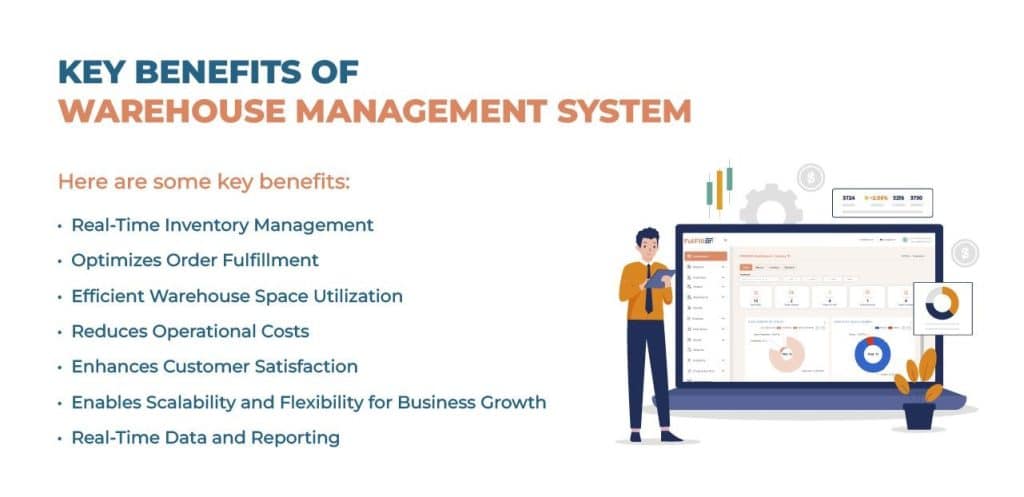As per the latest market insights, Warehouse management systems are in high demand in the e-commerce sector to meet the growing needs of customers and are expected to grow at 12.9% CAGR by 2032.
Are you unable to manage your warehouse with complex supply chains and increasing demands?
Tried traditional and manual warehousing, but nothing worked?
Then, it is time to replace your traditional warehouse management system with a modern and automated WMS.
It can be your game-changing tool in optimizing your warehouse operations, such as tracking inventories, goods, and orders in real-time, thereby reducing order inaccuracies and delayed shipments (order deliveries).
A modern, open-source WMS solution helps businesses track inventory, enhance order accuracy, and integrate with e-commerce and couriers for seamless logistics.
Challenges of Manual Warehouse Operations
Some of the issues businesses face with traditional manual warehouse operations are:
- Careless inventory management and order fulfillment
- Delayed deliveries that impact customer satisfaction.
- Poor time management in picking and packing causes unnecessary delays.
- Ineffectiveness leads to unnecessary labor expenses that make growing the business hard because there is more work to be done.
But a modern WMS can easily resolve these challenges by automating various warehouse operations, which ultimately reduces the chances of errors and enhances work productivity.
Why is a Warehouse Management System Important?
A warehouse management system, abbreviated as WMS, is software that helps businesses organize, manage, and control within a warehouse or distribution center. It optimizes and automates your supply chain operations by enhancing your inventory’s real-time visibility and productivity, order execution, and logistics. The purpose of WMS is to guarantee the proper storage and pickup, packing, and delivery of goods.
No matter if it is an e-commerce company, a retail store, or a 3PL company, a well-configured WMS is the backbone of your supply chain, improving its operations, reducing costs, and increasing the productivity of the workers. Modern WMS solutions like Fulfillor WMS are designed to provide real-time visibility, automate tasks, and enhance the efficiency of warehouse operations.
An efficient WMS software minimizes human errors by automating tasks, ultimately increasing the speed of shipping and delivery, and resulting in customer satisfaction. To stay competitive, businesses are adopting modern warehouse management systems that provide real-time inventory insights and advanced data analytics to forecast trends and demands.

Key Benefits of Warehouse Management System
1. Real-Time Inventory Management
Prior, businesses had to rely on manually written down inventory that can be faulty. But nowadays, modern WMS provides real-time inventory management features that minimize errors arising from human operation and therefore provide accurate data on stock levels that can be used for planning for both demand and inventory.
A modern WMS, you can maintain an ideal stock level to avoid situations of overstocking or stockouts and can monitor the inventory from multiple locations.
2. Optimizes Order Fulfillment
Order accuracy directly impacts customer satisfaction. A WMS automates all the operations from picking and packing to shipping, which leads to quick and accurate deliveries resulting in happy and satisfied customers.
This kind of automation reduces manual errors and increases operational speed and hence enables organizations to manage more volumes with more accuracy. For instance, modern warehouse management software comes with features like real-time data updates and barcode scanning that help in quick and accurate order fulfillment.
3. Efficient Warehouse Space Utilization
Be careful of how you use the space you have, or you’ll end up overcrowding the warehouse and spending more. A WMS plays an important role in optimizing warehouse flow by making the best use of your floor space depending on materials and tasks.
This leads to better space utilization, simpler product finding, and faster picks, which eventually reduces unnecessary costs in terms of the movement of items and recuperation.
4. Enhances Customer Satisfaction
The goal is to deliver quickly and accurately. Real-time order tracking and automated notifications are some features that provide customers with information about their order location, thus enhancing their experience, which ultimately leads to an improved customer experience, better customer retention, and positive reviews.
5. Enables Scalability and Flexibility for Business Growth
It very often becomes very difficult for businesses to handle their stock and warehouse operations as they expand. The WMS can scale up with growing order volumes and larger warehouses without loss of efficiency. It can also be flexible so that the changes are permissible to adapt to the dynamic business environment
6. Real-Time Data and Reporting
Analyzing real-time data is essential to make informed, effective, and profitable decisions. A WMS provides detailed insights as per analytics and reporting to allow businesses to make decisions.
Supply chain managers can figure out the key performance indicators, locate the order, and research to improve on these indicators. With advanced analytics, you can utilize demand forecasting to figure out which products sell faster during each season, identify trends, troubleshoot as issues arise, and look to the future.
Key features of an efficient Warehouse Management System:
A modern WMS can effectively solve all the challenges by automating various warehouse operations. Below are the reasons a modern WMS is considered one of the best solutions in the market:
- Simple Integration: An efficient WMS integrates with Shopify, Amazon, eBay, Walmart, and other major e-commerce platforms for hassle-free order fulfillment.
- Multi-location inventory management: Businesses would be able to manage their inventory across multiple warehouses seamlessly.
- Courier partnerships: Integrated with FedEx, UPS, DHL, and USPS for faster and more reliable shipping.
- Automated Order Fulfillment: As manual intervention reduces, so does the risk of errors leading to accurate order fulfillment.
- Scalability: Caters to businesses of any size, from small startups to large enterprises.
Conclusion
A warehouse management system (WMS) is a must-have for businesses managing inventories and logistics, not a luxury. It increases productivity, reduces errors, aids in maximizing the warehousing space, and increases customer satisfaction.






